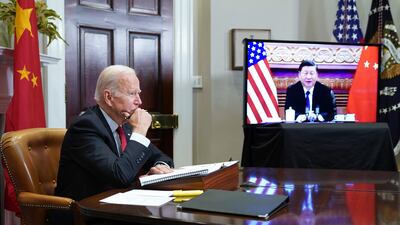US President Joe Biden’s participation in the Nato and EU summits in Brussels on March 24 is set to acquire historic importance. It could become a particularly fateful juncture if Nato leaders issue any sort of red line to Russian President Vladimir Putin regarding the war in Ukraine. Nato leaders could also decide to impose a no-fly zone. Ukraine’s President Volodymyr Zelenskyy has appealed to the US and EU for such a move, and rallied significant public opinion in those places behind him. Of course, this would be very risky because of the potential to draw Nato into direct conflict with Russia.
Should Mr Biden choose to meet Mr Zelenskyy during his time in Europe, he may get an historic moment without having to undertake such risks. The circumstances are ripe for something similar to John F Kennedy’s famous 1963 visit to Berlin, when he gave a rousing speech, defying Russia and declaring “I am a Berliner”. An “I am a Ukrainian” moment would certainly serve Mr Zelenskyy well.
But Mr Biden’s remarks in the past few days indicate he intends to step things up during his European tour, through measures that go beyond eloquent speeches. He went so far as to describe his Russian counterpart as a “war criminal” and a “thug”. These are not labels that normally serve as a prelude to diplomacy. The US still has tools at its disposal that fall short of war, including fully breaking off US-Russian relations and a full economic embargo. The upcoming Nato summit could see the alliance impose new sanctions to isolate Russia in an unprecedented manner – far beyond anything experienced by its other sanctioned ally, Iran.
Iran, for its part, is preparing for the West to lift sanctions against it following the anticipated revival of the nuclear agreement it signed in 2015 with the US, China, Russia, Germany, Britain and France. Despite the tension that emerged when Russia sought to link the new Iranian nuclear deal to the Ukraine crisis, Moscow has now obtained written guarantees from the US to reassure it. Russia still hopes to use the Iranian channel to sell its oil and does not want that channel to be sanctioned again.
The extent to which allies such as Iran and Venezuela have failed to defend Russia’s war vigorously is remarkable. Considering this, it is unsurprising that Moscow would be keen to keep its links with Iran sanctions-free, in the hope that its alliances remain stable, even if, for the moment, its friends are distancing themselves from the Kremlin.
Of course, there is no alliance more important for Russia’s strategic relations than the one with China. In Moscow’s view, China remains committed to its friendship with Russia, regardless of some impressions indicating China has also been pushed away by Putin’s actions in Ukraine.
For the rest of the world, however, China’s true position remains a mystery. Indeed, the sense of mystery is actually very useful to Beijing, which can deliberately avoid being restricted one way or the other for the sake of emotional or otherwise arbitrary considerations. While China’s massive geopolitical projects – things like the Belt and Road Initiative – are planned for decades to come, that does not mean its strategic doctrine is immune to something like the Ukrainian war – a development that has changed the entire norms of international relations.
There would be little doubt that China’s impression of Russia today is fundamentally different from the one it had on February 23, the day before the invasion of Ukraine. And this would surely impact China’s thinking on its future relationship with the US, perhaps in favour of a more stable one.
What Mr Biden wants from his Chinese counterpart Xi Jinping is a promise that the latter will not help Russia, especially militarily. Mr Biden wants Mr Xi to realise the seriousness and sharpness of the consequences if any Chinese banks or firms are used to facilitate Russian trade, consequences that include tough US sanctions on China. He wants to make it very clear that the US knows the biggest loophole Russia could attempt to use to evade western sanctions is the Chinese one. Indeed, Russia has always assumed that its ideological, strategic and economic depth went through China, and Moscow is betting on their shared sense of rivalry with the US.
Antagonising the US and Europe, however, is costly, and defending Russia in Ukraine may not be a worthwhile enough cause. Beijing, as the saying goes, does not stop at a crossroads without consulting a compass and plays the game of national interests just as well as Washington can and does. A phone call between Mr Biden and Mr Xi on Friday left the American side without a clear Chinese answer. It certainly seems that China will not gamble away its vital interests, including the Belt and Road initiative, by getting bogged down in something so divisive as Russia’s Ukraine ambitions. But that is a temporary stance for what many are reading as a temporary situation. Eventually, Russia will be out of the mess it has made for itself, and China is thinking perhaps more than the West about what comes after.


